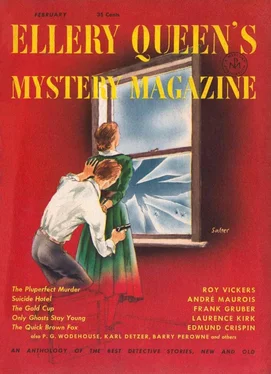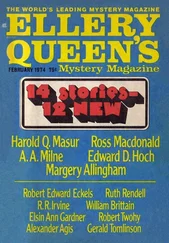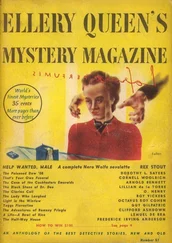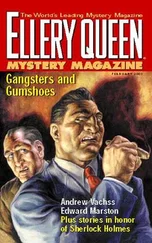E. Ashton - Ellery Queen’s Mystery Magazine. Vol. 19, No. 99, February 1952
Здесь есть возможность читать онлайн «E. Ashton - Ellery Queen’s Mystery Magazine. Vol. 19, No. 99, February 1952» весь текст электронной книги совершенно бесплатно (целиком полную версию без сокращений). В некоторых случаях можно слушать аудио, скачать через торрент в формате fb2 и присутствует краткое содержание. Город: New York, Год выпуска: 1952, Издательство: American Mercury, Жанр: Детектив, на английском языке. Описание произведения, (предисловие) а так же отзывы посетителей доступны на портале библиотеки ЛибКат.
- Название:Ellery Queen’s Mystery Magazine. Vol. 19, No. 99, February 1952
- Автор:
- Издательство:American Mercury
- Жанр:
- Год:1952
- Город:New York
- ISBN:нет данных
- Рейтинг книги:4 / 5. Голосов: 1
-
Избранное:Добавить в избранное
- Отзывы:
-
Ваша оценка:
- 80
- 1
- 2
- 3
- 4
- 5
Ellery Queen’s Mystery Magazine. Vol. 19, No. 99, February 1952: краткое содержание, описание и аннотация
Предлагаем к чтению аннотацию, описание, краткое содержание или предисловие (зависит от того, что написал сам автор книги «Ellery Queen’s Mystery Magazine. Vol. 19, No. 99, February 1952»). Если вы не нашли необходимую информацию о книге — напишите в комментариях, мы постараемся отыскать её.
Ellery Queen’s Mystery Magazine. Vol. 19, No. 99, February 1952 — читать онлайн бесплатно полную книгу (весь текст) целиком
Ниже представлен текст книги, разбитый по страницам. Система сохранения места последней прочитанной страницы, позволяет с удобством читать онлайн бесплатно книгу «Ellery Queen’s Mystery Magazine. Vol. 19, No. 99, February 1952», без необходимости каждый раз заново искать на чём Вы остановились. Поставьте закладку, и сможете в любой момент перейти на страницу, на которой закончили чтение.
Интервал:
Закладка:
“Where are we going?” I said.
“To the Imperial Embassy,” said Raffles. And in the hansom, bowling up toward Hyde Park Corner, he explained, “You can see what happened, Bunny. When it was realized that Benjamin, J., was responsible for the leak, Colonel Saxe would have had Benjamin, T., up on the carpet. Benjamin, T., would have denied any hand in the business, and he’d have revealed his hatred for his brother. The Colonel’s a clever man. He’d have docketed that hatred, and Benjamin, T.’s, physical likeness to his brother, for reference. The Colonel would have had Benjamin, T., put aside to simmer till he could see how best to make use of him.”
“And then?” I said.
“The Colonel is banished to an Embassy job,” Raffles said. “Meantime, he hears how well Benjamin, J. — our Mr. Benjamin — has come off. A pension, a lifelong tenancy under the Queen’s Grace and Favour. How His Imperial Majesty and the Colonel must have gritted their teeth over that! And then, Bunny, this imperial visit comes up, and the Colonel sees his chance. He arranges for Benjamin, T., to be brought over as a groom with the horses of the imperial suite. Then he puts his scheme to Benjamin, T. — that he take his brother’s place, draw the Queen’s pension, live rent-free for the rest of his life under the Queen’s Grace and Favour, while his brother is shipped back in his place to face whatever punishment His Imperial Majesty may order privily meted out. Probably life imprisonment. The poetry of it, Bunny! Benjamin, T., spending the rest of his life as the Queen’s pensioner, and Benjamin, J., the rest of his incarcerated secretly in His Imperial Majesty’s dungeon! And no one the wiser. The imperial suite has diplomatic immunity. I doubt whether our Mr. Benjamin has ever been able to put more than X — his mark — as a receipt for his pension. Can’t you see them chuckling, rubbing their hands — the Emperor, the Colonel, and the Vengeful Coachman? It’s a score over the Queen. It’s one in the eye for England. By Jove,” said Raffles, “they were really deuced unlucky to trip up over the dog!”
“How do you think that happened?” I asked.
“Pretty obvious,” said Raffles. “We know Mr. Benjamin and Captain went to Florian’s for their dinner, as usual. When they came strolling back, the dog at Mr. Benjamin’s heel, I fancy there must have been a four-wheeler drawn up in Park Yard. Our Mr. Benjamin walks up his steps, and is seized by the Colonel’s men. The little chap must have put up a fight, to judge from that bit of broken watch-chain. But they bundle him into the four-wheeler, and away with him. Unluckily for them, nobody notices the dog, which is probably scared and bolts back to the only place it knows where it has friends, the place where I find him sniffing forlornly round the door — Florian’s.”
The hansom bowled round a corner just then, and there ahead, between the jogging ears of the horse, was a shine of lights from the lofty windows of the Imperial Embassy.
The hatch in the roof of our hansom opened. The cabbie screwed a purple face into the orifice to breathe down on us a reminiscence of breweries.
“Right up to the hentrance, sir?” he said.
“Right up to the entrance,” said Raffles, and he handed up a coin. “There’s another half-bar for you if you wait for us.”
“You’re a toff,” said the cabbie.
He dropped the flap, his whip cracked, and we went past the waiting carriages at a jingling trot, to pull up with a flourish at the red carpet laid across the sidewalk under a canopy. Raffles threw back the apron. A flunkey gorgeous in knee-breeches hastened forward to hand him down.
The flunkey seemed taken aback by our morning dress. From the open windows of the second floor came the strains of an orchestra. A ball was in progress.
“Kindly inform Colonel Saxe,” Raffles said to the flunkey, “that two gentlemen who prefer to be nameless are here to see him in the matter of the coachman’s dog.”
“The coachman’s dog, sir?” said the flunkey.
“Just so,” said Raffles.
The flunkey hesitated only for a moment. Then he motioned us to follow him. We mounted the steps, crossed a vast hall and were ushered into a spacious morning room.
I turned quickly to Raffles as the door closed. “What are you planning?” I said. I was uneasy; it seemed to me that we had thrust our heads gratuitously into the lions’ den.
He put a warning finger to his lips. “An admirable likeness, Bunny,” he said conversationally, and nodded toward a huge portrait in a gilt frame above the lofty marble mantelpiece.
The crystal door-knob rattled. The door opened and a squat, broad-shouldered man strode in. He had a jutting, ivory-hard jaw, heavily-pouched and stony eyes, and greying, thin hair brushed straight back from a massive forehead. He wore a dark blue uniform, the skin-tight trousers strapped under patent-leather shoes. Behind him was a tall, pale-faced, aquiline man, younger, with sleek black hair and a contemptuous expression, wearing a more striking uniform glittering with jewelled orders.
Raffles addressed the shorter man. “Good evening, Colonel Saxe.”
The Colonel stood with legs straddled, his hands behind him, his jaw jutting pugnaciously. “You have the advantage of me, sir,” he said harshly.
“And I propose,” Raffles said, in an icy voice, “to use it. I give you two minutes, Colonel, to produce the person of Her Majesty’s subject, Mr. J. Benjamin.”
The squat Colonel stood as though rooted. I did not breathe. So still was the great room that the ticking of the marble clock on the mantelpiece was audible.
The Colonel broke the silence with an effort. “Sir,” he said thickly, “you are talking in riddles.”
“A riddle of two coachmen, Colonel,” said Raffles. “You’re unlucky in your agents. They bungled their job. They substituted T. Benjamin for J. Benjamin, but they overlooked J. Benjamin’s dog. The dog unmasked the impostor. Unfortunate for you, Colonel. That dog is now in safe hands, for delivery to Scotland Yard, together with a letter exposing your manoeuvre, in the event that my friend here and I do not report back, bringing Mr. J. Benjamin, by midnight precisely.”
A vein swelled, throbbing, on the Colonel’s massive brow. “Who are you?” he said hoarsely.
“Private gentlemen,” Raffles said, “and, I trust, sportsmen. You’ve played and lost. We’ve no desire to make trouble. Whether a certain august personage—” he glanced fleetingly at the portrait above the mantelpiece — “is aware of your manoeuvre, or whether it’s a brilliant bit of initiative on your own part, you know better than I. You are also in a better position to judge of the possible effects, diplomatically, if this unfortunate affair should become publicly known.”
The Colonel opened his mouth, closed it. His neck thickened, flushing darkly, above the tight, gold-crusted collar of his uniform. Suddenly he turned on his gorgeous lieutenant.
“Your bungling,” said the Colonel. “Your mismanagement, you titled nincompoop! This is what happens when they send me high-well-born halfwits as recruits to Intelligence! Get out! Get the man. Bring him here.”
The blue, close-set eyes of the younger man glittered as icily as the gemmed orders on his breast. But without a word he clicked his heels and strode from the room. Colonel Saxe walked across the parquet floor, his heavy shoulders hunched, his hands clasping and unclasping behind his back. He turned on the hearthrug, his pouched, stony eyes on Raffles.
“As you have said, sir,” said Colonel Saxe, speaking with difficulty, “I have played and lost. I am prepared—” he breathed hard through his nose — “I am prepared, in order to ensure that this affair remains between ourselves, to meet any reasonable monetary claim you may—”
Читать дальшеИнтервал:
Закладка:
Похожие книги на «Ellery Queen’s Mystery Magazine. Vol. 19, No. 99, February 1952»
Представляем Вашему вниманию похожие книги на «Ellery Queen’s Mystery Magazine. Vol. 19, No. 99, February 1952» списком для выбора. Мы отобрали схожую по названию и смыслу литературу в надежде предоставить читателям больше вариантов отыскать новые, интересные, ещё непрочитанные произведения.
Обсуждение, отзывы о книге «Ellery Queen’s Mystery Magazine. Vol. 19, No. 99, February 1952» и просто собственные мнения читателей. Оставьте ваши комментарии, напишите, что Вы думаете о произведении, его смысле или главных героях. Укажите что конкретно понравилось, а что нет, и почему Вы так считаете.












